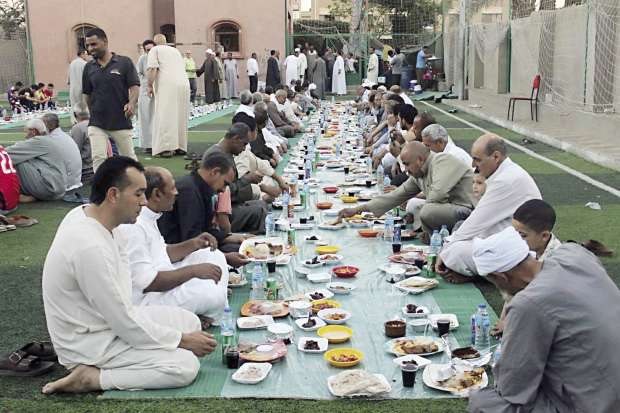CAIRO: Hardly a street in Egypt is without its iftar table as families organize “mercy meals” for friends, relatives and neighbors during Ramadan.
A tradition that began to help the poor has been extended to include entire streets and neighborhoods, giving residents and friends a chance to meet, share old memories and instil community values in their children.
In Cairo, people compete to organize large iftar tables laden with food items.
Each year Moataz Aburiyeh plans an iftar table for friends and neighbors in the capital’s central Abdin area.
“I consider it a great opportunity to see a lot of friends and talk about everything,” 38-year-old Aburiyeh told Arab News.
The table contains all kinds of food. “On the table is meat, chicken, rice, salad and other items. I know the family and neighbors’ preferences and I meet their taste,” said Aburiyeh, who owns a men’s clothing store.
Meanwhile, residents in Umm Reza, a village west of Cairo, organized an iftar table to gather all the people of the village for the second year in a row.
School teacher Khaled Kamal, who was behind the idea, said: “I suggested to residents that they gather during Ramadan and everyone welcomed the idea.”
Villagers donated money for the gathering until they had raised more than 10,000 Egyptian pounds ($600).
“We let all the people of the village, including Christians, share the meal,” said Kamal.
Another villager, Sayed Fouad, said: “The iftar was well organized and included hot meals consisting of meat, rice, vegetables, salad, pickles and damietta sweets.”
National unity
For the past five decades, Christian clerics in Egypt have organized annual Muslim iftar meals to encourage national unity.
In the 1970s, the Coptic religious brotherhood began hosting Ramadan meals for Muslims, a move that was followed by the Justice and Peace association a decade later.
Pope Shenouda, the Coptic Orthodox Pope of Alexandria, promoted iftar meals to strengthen the church’s connection with the Egyptian nation.
The Church of the Palace of Dupara in Tahrir Square in central Cairo has been organizing a breakfast table for several years, attended by Muslim and Christian leaders. The church is being supervised by a number of young men and women.
Coptic scholar Robert Al-Fares said: “The Christians of Egypt are organizing iftar to show that society has returned to a period of friendship and unified spirit.
“This is a positive phenomenon that confirms the end of a dark era of division between sects and religions,” he said, referring to the rule of the Muslim Brotherhood in 2012 and 2013.
“Egyptians have returned to their normal state after a period of radicalization by extremists who sought to destroy the culture of tolerance and acceptance between Egyptian people,” Al-Fares said.



























